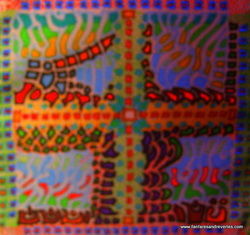 Pen & ink, 7" square. Artist: G. Tompkins
Pen & ink, 7" square. Artist: G. Tompkins One of the great writers associated with live television dramas of the 1950's was the American screenwriter, playwright and television producer Rod Serling. Serling became well known for his dramatic presentations entitled "Patterns" (1955) and "Requiem for a Heavyweight" (1956). Kraft Television Theater, Appointment with Adventure, Hallmark Hall of Fame and Playhouse 90 provided Serling with a host of opportunities to share his creative vision through the writing of highly original scripts during this fertile period. Eventual awards would include the Emmy, Hugo, Peabody and Golden Globe alongside the popular notoriety gained through the ground-breaking anthology which came to be known as "The Twilight Zone."
The Twilight Zone 1959-1964
Out of a total 156 Twilight Zone episodes, Rod Serling wrote the scripts for 92 stories, altogether offering a rather impressive collection of both science fiction and fantasy elements. Each week I looked forward to watching this series and then sought out alternative interpretations or individualistic impressions from my family, friends and like-minded viewers. For the first time I sensed that television could offer the very best writing, casting, photography, set design, soundtrack music, direction and brilliance of production which normally might be associated only with motion pictures or the classic films shown at movie theaters. I still find this series to offer some highly original thoughts and thoroughly imaginative scenarios, ideas capable of stimulating the creativity of the contemporary mind.
A Dimension of Sight, Sound and Imagination
Serling's introduction and voice-over always begin each episode with some thought-provoking phrases, ideas or tantalizing prospects. He speaks about the vastness of space, the timelessness of infinity, the "middle ground between light & shadow, science & superstition," an area which stretches from "the pit of man's fears to the summit of his knowledge." Both the introduction and the epilogue provide a personal journey into the unknown, the fantastic, the supernatural as well as the sometimes very human elements interwoven into the science fiction/fantasy genre. I find Serling's initial and concluding comments for each episode to be a recitation of some of the most vivid, memorable and fascinating lines from the entire five seasons of "The Twilight Zone."
 RSS Feed
RSS Feed